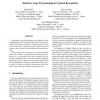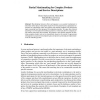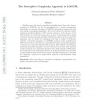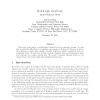482 search results - page 45 / 97 » Expressive probabilistic description logics |
ICDAR
2009
IEEE
14 years 2 months ago
2009
IEEE
In this paper, we make an attempt to use Inductive Logic Programming (ILP) to automatically learn non trivial descriptions of symbols, based on a formal description. This work is ...
MKWI
2008
13 years 9 months ago
2008
: Matchmaking between offers and requests is an essential mechanism in electronic market places. Description Logics have been proposed as a appropriate framework for representing o...
IAT
2009
IEEE
13 years 11 months ago
2009
IEEE
Recently, multi-attribute negotiation has been extensively studied from a game-theoretic viewpoint. Since normal and extensive form games have the drawback of requiring an explicit...
CORR
1998
Springer
13 years 7 months ago
1998
Springer
Building upon the known generalized-quantifier-based first-order characterization of LOGCFL, we lay the groundwork for a deeper investigation. Specifically, we examine subclass...
BIRTHDAY
1991
Springer
13 years 11 months ago
1991
Springer
First-order modal logics, as traditionally formulated, are not expressive enough. It is this that is behind the difficulties in formulating a good analog of Herbrand’s Theorem, ...




